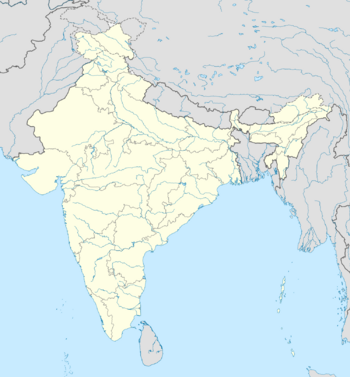Soanian
Topic: Social
 From HandWiki - Reading time: 7 min
From HandWiki - Reading time: 7 min
The Soanian is a archaeological culture of the Lower Paleolithic in the Siwalik region of the Indian subcontinent.[1] Contemporary to the Acheulean, it is named after the Soan Valley in Pakistan.[2] Soanian sites are found along the Sivalik region in present-day India, Nepal and Pakistan.[3]
Findings
The term "Soan Culture" was first used by Hellmut De Terra in 1936,[4] but D. N. Wadia had identified the presence of these archaeological implements in 1928.[5] Further archaeological research was conducted by Stephen Lycett in order to determine the morphometric assessment of the Soanian techno-complex. The result of this experiment concluded that the Soanian techno-complex contains a Mode 3 Levallois technique core component.[1]
At Adiala and Khasala Kalan, about 16 km (9.9 mi) from Rawalpindi terrace on the bend of the river, hundreds of edged pebble tools were discovered. At Chauntra in Himachal Pradesh, hand axes and cleavers were found. Tools up to two million years old have been recovered. In the Soan River Gorge, many fossil bearing rocks are exposed on the surface. 14 million year old fossils of gazelle, rhinoceros, crocodile, giraffe and rodents have been found there. Some of these fossils are on display at the Pakistan Museum of Natural History in Islamabad.
Spread across Shivalik Hills region
The earliest Paleolithic hominin archaeological site in the Indian subcontinent at the Soan Sakaser Valley,[6] is part of Soanian, sites of are found in the Sivalik Hills across what are now India, Pakistan, and Nepal.[3][1]
See also
| The Paleolithic |
|---|
| ↑ Pliocene (before Homo) |
| ↓ Mesolithic |
- Madrasian culture
References
Further reading
- Dani Ahmad Hasan (1964). "Prehistoric Pakistan". Asian Perspectives 7: 183–188. http://scholarspace.manoa.hawaii.edu/bitstream/handle/10125/16722/AP-v7n1-2-183-188.pdf?sequence=1.
- B. B. Lal (1964). "A Decade of Prehistoric and Protohistoric Archaeology in India, 1951–1960". Asian Perspectives 7 (1–2): 144–159. http://scholarspace.manoa.hawaii.edu/bitstream/handle/10125/16720/AP-v7n1-2-144-159.pdf.txt;jsessionid=737E60BE5DD68EB393620E6585167F9B?sequence=2.
- Hellmut De Terra (1969). Early man: as depicted by leading authorities at the International symposium, the Academy of Natural Sciences, Philadelphia, March 1937. Ayer Publishing, Academy of Natural Sciences of Philadelphia. pp. 263–. ISBN 978-0-8369-1184-8. https://books.google.com/books?id=t8yCCB8BHFcC&pg=PA263. Retrieved 21 August 2011.
- J. Armand (1979). "The Middle Pleistocene Pebble Tool Site of Durkadi in Central India". Paléorient 5: 105–144. doi:10.3406/paleo.1979.4242. http://www.persee.fr/web/revues/home/prescript/article/paleo_0153-9345_1979_num_5_1_4242.
- J. Armand (1985). "The Emergence of the Handaxe Tradition in Asia, with Special Reference to India". in V. N. Misra, Peter S. Bellwood. Recent advances in Indo-Pacific prehistory: proceedings of the international symposium held at Poona, December 19–21, 1978. BRILL. pp. 4–. ISBN 978-90-04-07512-2. https://books.google.com/books?id=gMoJj-0Z94UC&pg=PA4. Retrieved 22 August 2011.
- V. A. Ranov; D. Dorj; Lu Zün-E (1999). Vadim Mikhaĭlovich Masson. ed. History of civilizations of Central Asia. Motilal Banarsidass. pp. 45–. ISBN 978-81-208-1407-3. https://books.google.com/books?id=GXzycd3dT9kC&pg=PA45. Retrieved 21 August 2011.
- Kenneth Oakley (30 April 2007). Frameworks for Dating Fossil Man. Transaction Publishers. pp. 223–. ISBN 978-0-202-30960-6. https://books.google.com/books?id=qrmOwp2swlgC&pg=PA223. Retrieved 21 August 2011.
External links
 KSF
KSF
